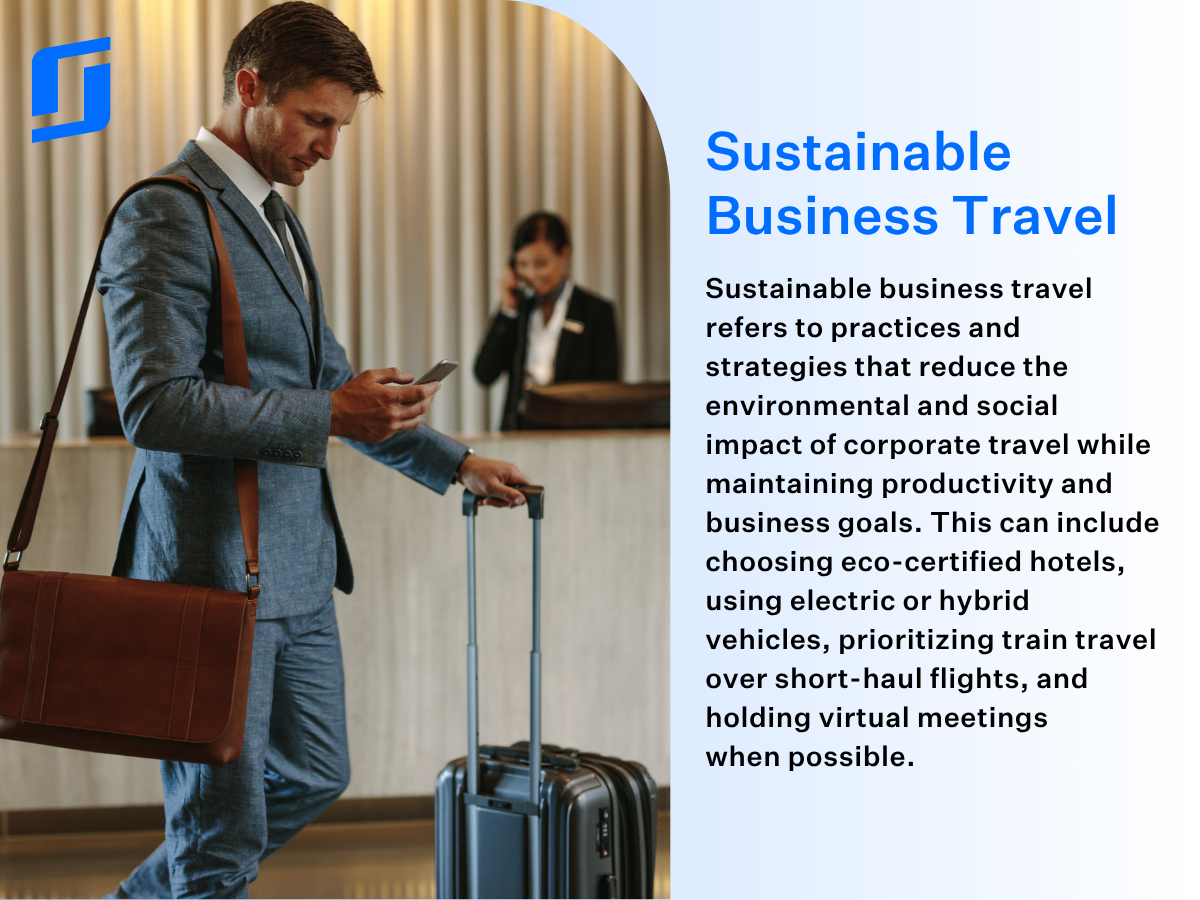What is sustainable business travel?
Sustainable business travel is a hotel’s way of meeting corporate guests’ needs while actively cutting carbon emissions, preserving local resources, and supporting the communities that host those travellers. In practice it means offering responsible transport options, energy-efficient rooms, and transparent reporting so companies can reach their own climate targets without giving up productivity or comfort.
The push for greener trips is gathering pace. Global business-travel spending was forecast to reach US $1.48 trillion in 2024, already surpassing pre-pandemic levels, so the pressure is on to shrink the footprint of every overnight stay. Forward-thinking corporate buyers now look beyond room rate; they evaluate a property’s energy mix, waste policies, and ability to track emissions per guest night.
For hotel managers, sustainable business travel is not a niche add-on. It influences RFP results, unlocks premium corporate rates, and positions your brand as a responsible partner in a world where regulators, investors, and travellers expect measurable climate action.
In this blog, we will break down the strategies, certifications, and tech tools that help hotels attract eco-conscious corporate accounts while keeping costs in check.
Table of contents
Why is sustainable business travel important for hotels?
Corporate clients and their travellers now expect proof that a hotel is reducing its climate impact, and they steer bookings towards properties that deliver. Nearly 93% of global travellers aim to make more sustainable choices and 82% of companies set organisation-wide sustainability goals, with 45% applying specific targets to business travel.
Hotels that can document real progress enjoy a clear commercial upside. Participants in the Green Stay Initiative won 22% more corporate RFPs for 2024 programmes than non-certified competitors. On-site energy upgrades and waste reduction projects also cut operating costs and keep properties ahead of emerging disclosure rules, protecting both margin and reputation.
Key takeaways:
- Traveller and buyer expectations have shifted: 93% of guests favour sustainable options and most companies link travel choices to climate goals.
- Eco-certified hotels secured 22% more corporate contracts, proving that green credentials translate into revenue.
- Efficiency projects lower utility bills and prepare properties for stricter reporting laws, turning sustainability into both a defensive and offensive business strategy.
Make sustainability matter at your business with SiteMinder
SiteMinder showcases your eco-friendly rooms to a global audience and reveals which ‘green’ upgrades guests book, turning sustainability into higher corporate revenue.
Learn more
How can hotels implement sustainable practices that appeal to business travellers?
Key insights of sustainable practices show that:
- Energy efficiency upgrades lower utility costs and can lift ADR, while signalling progress in carbon reduction programmes.
- Plastic-free amenities, app-based check-in, and robust recycling give travellers visible ways to act sustainably during their stay.
- Verified green certification and locally sourced, plant-forward dining provide hard evidence that helps hotels win corporate RFPs.
Corporate buyers look for quick wins they can show on their own sustainability scorecards. Focus on actions that cut waste, save money, and are easy to communicate across multiple properties.
1. Energy efficiency
Swapping to LED lighting, tuning HVAC schedules, and installing smart sensors can trim power use by a tenth. For a full-service hotel that 10% cut is worth about US $1.35 in extra ADR for every occupied room. Promote the savings in RFPs to show buyers you are protecting both the planet and their travel budgets.
2. Eco-friendly amenities
Plastic-free bathroom kits, bulk dispensers, and compostable slippers strike a chord with guests. Nearly 6 in 10 travellers prefer hotels that eliminate single-use plastics. Highlight these swaps on your booking engine so corporate travellers see tangible proof before they arrive.
3. Digital check-in
Speed and sustainability go hand-in-hand. Seventy percent of American travellers would skip the front desk for an app or kiosk. Digital keys reduce printed paperwork and shrink lobby congestion, a welcome perk for time-pressed road warriors.

4. Sustainable dining
Menus that champion local, plant-forward dishes resonate with corporate wellness policies. Ninety percent of diners favour restaurants with strong sustainable practices. Source ingredients nearby, flag carbon-friendly meals, and share the story on table tents or QR codes.
5. Green certification
Third-party seals instantly verify your efforts. Forty-nine percent of travellers are more likely to book a property when its certification is presented clearly. Display badges on rate sheets, websites, and distribution channels to lift conversion with eco-conscious corporates.
6. Recycling programs
Visible recycling bins and back-of-house waste sorting earn trust. Only 9% of the world’s plastic waste has been recycled, so showing guests how their stay avoids landfill makes a strong impression. Train housekeeping to keep streams clean and track diversion rates you can share in quarterly reports.
Connect with travel agents worldwide via the GDS SiteMinder provides seamless connectivity to global distribution system vendors, giving you instant access to travel agents and corporate booking channels worldwide.
How can technologies help hotels manage sustainability across multiple properties?
A software platform like SiteMinder gathers every property’s sustainability data in one dashboard, making targets, progress, and disclosures easy to track and share. SiteMinder then turns that information into revenue by pushing updated room descriptions that highlight environmental features to every OTA, metasearch site, and direct booking channel in a single action. The system can also attach upsells like farm-to-table dining or carbon-offset packages during the booking flow.
This extra visibility matters, because 59% of travellers want to filter for properties with strong sustainability credentials when they book.
SiteMinder’s analytics layer reveals which green initiatives actually influence clicks and confirmed stays. By tracking guest search terms, booking paths, and add-on purchases, the platform shows whether guests respond more to refill stations, rooftop solar, or local-produce menus, letting you focus investment where it drives the greatest return.
Key takeaways:
- Centralised dashboards: collect and monitor carbon, water, and waste metrics across all properties in one place, simplifying compliance and reporting.
- Consistency at scale: update room descriptions with new sustainability features and attach green upsells across every sales channel without extra manual work.
- Data-driven targeting: analyse booking behaviour to discover which eco initiatives lift conversion and revenue, then refine offers for stronger corporate appeal.
FAQs about sustainable business travel
What certifications or eco-labels help build credibility with corporate clients?
Focus on labels that travel-management companies already track. Green Key, EarthCheck, and LEED appear most often in RFP scorecards and online booking filters. Green Key alone is held by more than 7,900 hotels across 90 countries, giving buyers a familiar benchmark.
How do I know which sustainability initiatives matter most to business travellers?
Start with guest data. Booking analytics can show whether rooms with plastic-free amenities or refill stations convert better than standard options. Industry surveys also help, using the data gathered from your peers to better inform your own strategies.
How can hotels effectively market their sustainable offerings to business travellers?
Display certifications and a short sustainability scorecard on your website, OTAs, and GDS listings. Offer green upsells at checkout, such as locally sourced dining or carbon-offset packages, and promote success stories on LinkedIn where corporate travel buyers research suppliers. SiteMinder can automate these content updates across every channel, ensuring a consistent message without extra manual work.


